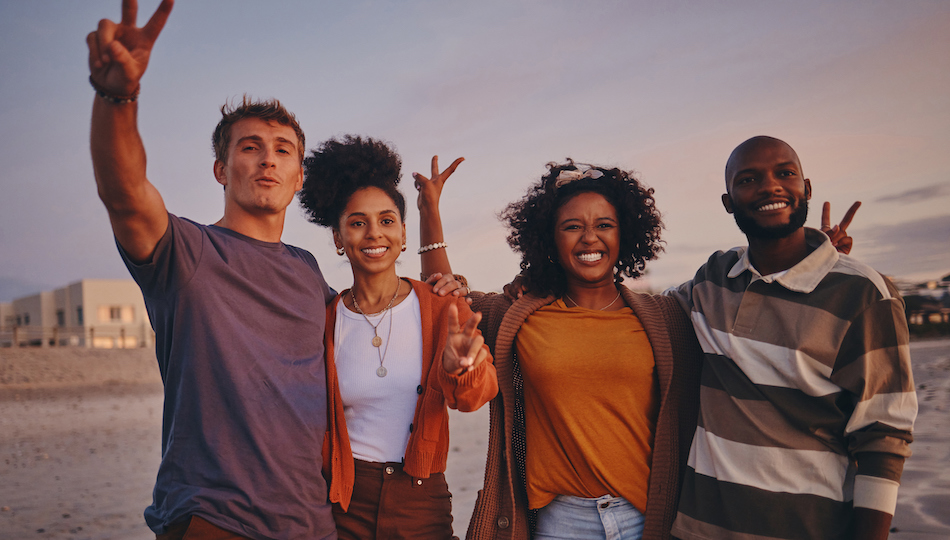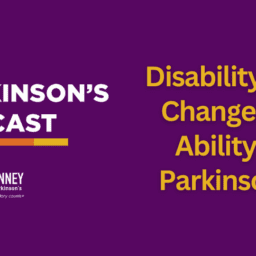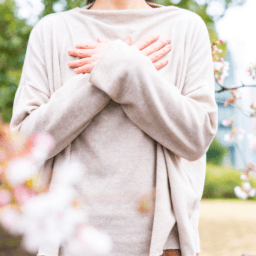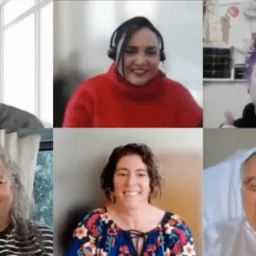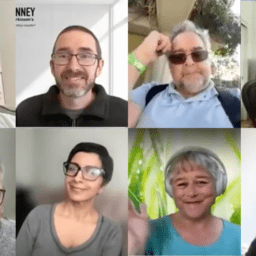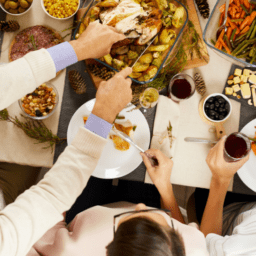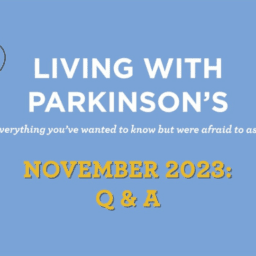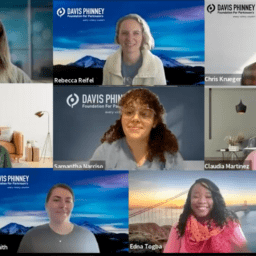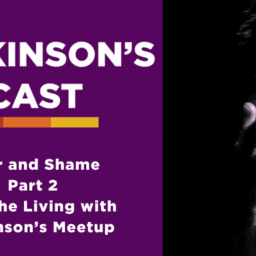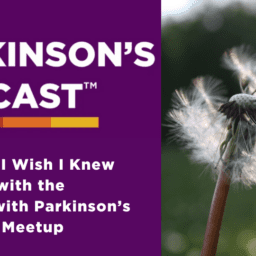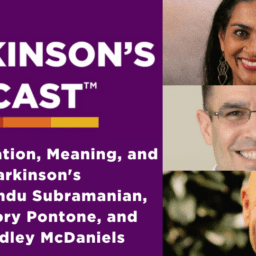During this session, we discussed LOVE, relationships, and care partners, whether they be spouses, kids, friends, neighbors, etc. Watch the recording below and scroll down for our show notes and resources. See you next month on March 16, 2023, at 1 pm MDT. Not yet registered for the monthly meetups? You can do that here.
You can read the transcript below or you can download it here.
Note: This is not a flawless, word-for-word transcript, but it’s close.
Melani Dizon (Director of Education and Content, Davis Phinney Foundation):
Hello and welcome everybody. Hi, Kevin. My name is Melani Dizon. I’m the Director of Education and Content at the Davis Phinney Foundation. And you are here at our Living with Parkinson’s meetup. Tom is going to lead us today in a really fabulous conversation about, well, I think he is, I don’t know where he went. He’s going to, and we’re going to talk about love and relationships and care partnering and all of that. So, what I would love to start with, as we usually do, is just, I’m going to call on you and we’ll go around really quick for those of us who are new in the audience, to just let people know who you are and why you are a part of this fabulous panel that we get to meet with every month. So, Doug, you’re the first on my screen.
Doug Reid (Ambassador, Davis Phinney Foundation):
I’m sorry, I was tuned out. Okay. Are we just introducing ourselves?
Melani Dizon:
Just say hi, who you are, where you’re from, and then how you got involved in this panel.
Doug Reid:
Okay. Hi. Hi, everyone. I’m Doug Reid. Was diagnosed with Parkinson’s about 13 years ago and was exhibiting symptoms for two to three years before that. Had DBS just over three years ago, and I’m doing a lot better. I volunteer at the Davis Phinney Foundation. I live only about 15 minutes away. And so, through that, I became part of this group, which I’m happy to be a part of.
Melani Dizon:
Thanks, Doug. We love having you and we love having you so close to the office. Kevin,
Kevin Kwok (Ambassador, Davis Phinney Foundation):
Hey everyone. I’m Kevin Kwok. I’m also dialing in here from Boulder. I’ve been living with Parkinson’s for about 14 years. I’m on the board of the Davis Phinney Foundation, and I think I’ve been on this council since the onset of it several years ago.
Melani Dizon:
Yeah, I think we’re going.
Kevin Kwok:
This is one of my favorite things that I do.
Melani Dizon:
Thanks, Kevin. Kat.
Kat Hill (Ambassador, Davis Phinney Foundation):
Hi everybody. I’m Kat Hill and I’m currently calling in from the Palm Desert area in southern California. And let’s see, I’ve had Parkinson’s. I’ve been diagnosed for over eight years, probably been with me longer than that, like most of you. And I am a retired nurse practitioner and midwife, and really honored to be a part of this group since its inception, so I’m really happy to be here.
Melani Dizon:
Thanks, Kat. Robynn.
Robynn Moraites (Ambassador, Davis Phinney Foundation):
Hey, everybody. I’m Robynn Moraites, diagnosed in 2015 at the age of 46, but knowing the constellation of symptoms, my symptoms date back to 2002, 2003. So been living with it for a really long time. And I got involved with the panel because I became friends with Amy who was on the panel, and she had done that for a couple of years and decided she wanted to step aside, and she nominated me. So, I’m really glad to be here.
Melani Dizon:
Thanks, Robynn. Amber?
Amber Hesford (Ambassador, Davis Phinney Foundation):
Hi, I’m Amber. I’m in El Paso, Texas. I’ve been living with Parkinson’s for, oh, I don’t know,, I don’t know, math, I think like eight years. I started sharing my story on TikTok and it introduced me to some wonderful people. And actually, Kevin introduced me to the Davis Phinney Foundation, and that’s how I got involved with the panel.
Melani Dizon:
Thanks, Amber. Hey, Kevin. Great having you. Brian.
Brian Reedy (Ambassador, Davis Phinney Foundation):
Hi, I’m Brian. I’m in Huntington Beach area in Southern California. I’ve had Parkinson’s for 12 years and have been working with the foundation for five or six, I don’t know, maybe seven. We were the second group. My wife and I were the second group of ambassadors brought in when there was just seven or eight of us before. There were, what are, there’re now.
Melani Dizon:
60, 89, 80 something crazy.
Brian Reedy:
It’s growing, but it’s beautifully growing. So anyway, that’s me,
Melani Dizon:
Thanks, Brian. All right, Tom, I’m going to let you take it away, introduce yourself, and then you go for it. I’m going to step aside and let you do it.
Tom Palizzi (Ambassador, Davis Phinney Foundation):
Well, okay. Thanks, thanks much, Mel. Hi, everybody. Hi, esteemed colleagues. It’s good to be back with you guys. I’ve been delinquent for a while. We’ve been doing a little bit of traveling, my wife and I, my care partner and I, the love of my life, and I have been doing some fun stuff. Anyway, today we wanted to talk about love really and love in the form of relationships primarily with our care partners, if we have care partners, and just explore some of the things that go on there and what kind of impact Parkinson’s has on both the relationship as well as the people that, you know, just our family and friends and whatever. So anyway, you know, love conjures up an array of interpretations and meanings and definitions.
I think the Greeks have had four words they use to describe love, four different kinds of love according to the Greeks, and they’re good guys. You know, it’s even been defined as a drug by Tudors and poets for that matter. And today, I think, you know, we all seem, love is sometimes it’s messy and sometimes it’s complicated, and sometimes it’s just difficult. But at the end of the day, I think we all enjoy the benefits we get from being in a relationship and being in love in that type of thing. So, it’s not really, this isn’t really about intimacy. This is just about how, how the word love fits with, between Parkinson’s and relationships. And again, on the heels of Valentine’s Day, we thought this was kind of appropriate a day dedicated to celebrating that emotion.
So, we want to take a look at how it impacts the relationships with the ones we love, spouses significant others, kids, family, friends, neighbors, and of course care partners. And then we also want to explore how people who don’t have a care partner deal with things like that. So again, my name’s Tom Polisi. I was diagnosed in 2008, so it’s been a number of years. I’ve been playing around with Parkinson’s. I was 48 years old at the time. And my kids were home. They were re relatively; they were just starting college about that age end of high school being in college. And it had all kinds of impacts on our relationship with them and me, myself, and my wife in nothing bad. It was just difficult. You know, it’s something we had to navigate through. And my kids are older now.
We’re all 16 years older, and my wife and I are still together, still quite happy. And I know I’m a bigger pain in her butt than I ever was before, but we’re not going to talk about that. So anyway, I think I’ve seen a lot of different situations arise from Parkinson’s and its impact between people husbands and wives primarily, and boyfriends and girlfriends, et cetera. But I’ve also seen that hasn’t been good, but I’ve seen so many more that have been very good. So, in other words, it might have started out not so good, but it ended up actually turning a corner and becoming good for everybody involved. So, I think it, with that, I want to go ahead and just open the floor up. I asked the folks that are on this call today that are leading this call to think about it and consider how Parkinson’s not only challenges those living with it, but those who we share our love with. So, if anybody’d like to take it from there, that’d be great
Brian Reedy:
To jump in. I see somebody asked a question in the chat box that says, how do you deal with care partners who think you’re going to get better if you just blank, more, like do more, walk more, probably something like that. And I think so I had the greatest care partner in the world. She passed away two years ago. But the way we worked things out when I was first diagnosed was we, at, at first, it took me a while to understand what the symptoms where you know, what was Parkinson’s and what was just getting older or whatnot. But as I found things, I found that the more we dialogued about it, instead of just kind of trudging through it better, we were so I think when you get to a question like that, it’s, you know, listen to them, hear them out and pry it. Don’t, I think our first impulse is no, because as Parkinson’s, it’s, I think, at least with me, I was more bullheaded and like, no, I can manage this myself kind of thing. But then listen to them and see if it works out and touch, touch base with them again, don’t just necessarily blow it off because it’s a partnership. And that’s how it works. It’s a partnership is you work through it together. So that’s my input, Tom.
Robynn Moraites:
I’ll add something here. My mother also has Parkinson’s, and we were recently, her health took a steep decline recently. And I was talking with my brother about it, and he said, I just don’t understand. And what he was questioning was the variability of the symptoms, even though I’ve been diagnosed since 2015 and my mom’s been diagnosed since about 2018, he just didn’t understand. He said, shouldn’t it be more like this? And I said, no. And I used it as an opportunity for education. I suggested that he watched some old webinars here where we talk about the variability of symptoms day to day, hour to hour, and that there’s no real explanation as to why things, why you’re having a good day, why you’re having a bad day, why you’re having a good five minutes, or why you’re having a bad five minutes. So, it is an opportunity for education. That’s all I’ll say there.
Tom Palizzi:
Yeah, I know. I have that similar experience that Brian, that you brought up about and I’ve had that with my family and again, people that I love dearly, and for the longest time they kept asking, when are you going to get better? And I thought, well, you know, yesterday, yesterday I was better than today and tomorrow I’ll be, today will be better than yesterday and et cetera. So that’s a good point. And using that as an opportunity to educate people on what, how Parkinson’s goes. So, and we all know how, how different it’s for everybody else. Anybody else got else they want to add?
Robynn Moraites:
Kevin had some.
Kevin Kwok:
Yeah, I like for, before we even go on, I first wanted to say thank you to the people that are care partners, because you have the hardest job in the world. We, as patients feel like Parkinson’s hard, but we’re just trying to understand day-to-day surviving, and we’re expecting people like you to read our minds. Yeah. It’s so impossible to do that if we don’t even know how we are going to be day to day. So anyway, I wanted to start with that. I’m a guy that’s actually messed up a couple care partners in my life. you know, I’ve been divorced. I actually pushed my partners away in the beginning when I was still trying to be macho with having, dealing with Parkinson’s. And I think if I were to play back in rewind, I would do a lot of things very differently. I think today I’m a much humbler guy than I was when I first was diagnosed than I was sort of trying to be Superman. I’m lucky the fact that I have found a great care partner today, but I’ve also learned a lot of lessons along the way that I hope we’ll discuss in the course of this call today.
Tom Palizzi:
Thanks Kevin. So, Kat?
Kat Hill:
Yeah, I just, I just want to echo a little bit about the people that we love the most sometimes are the easiest to take out some of our frustrations with. And I think we need to remember that. And I think that they can’t be inside our heads, just like Kevin said, they can’t read our minds. And so, I love the idea of inviting them to share in information gathering and knowledge building and having it not just be me communicating directly to them the information, I think it’s safe and more comfortable sometimes for them to get the information even from outside sources and digest it at will. And then, and then also making time to talk about it. I know for me; I don’t want to talk about it a lot. I don’t want to talk about it over dinner. I don’t want it to be the focus of my interaction with my adult children. And on the other side of that, I think we have a responsibility to communicate in times where we’re not feeling frustrated or overwhelmed about how we’re doing. And so, giving them the information that they need to feel like they’re informed too, is important.
Kevin Kwok:
Yes. And each of communication is probably one of the most complex things you bring up because I find that as I progress my ability to articulate words even to hell, the conversation where I’m getting my point across becomes more challenging. And oftentimes what’s happening for me is I withdraw. You get into a confrontational conversation, and you want to get your points in to try to explain what’s going on, and instead you just sort of sit there and just absorb it. That is not effective communication. And I’m really guilty of not saying what I feel in a non-emotional way. And you can’t hold your partner accountable if they don’t know what you’re thinking. But it’s a very, the issue as we progress with Parkinson’s is as hard to get words out. It’s impossible to type. It’s, it is just really challenging.
Tom Palizzi:
Yeah. Thanks, Kevin. I agree with that. It’s you know, I’m slower to get out of the car, so, you know, my wife will get out and she’ll take off for wherever it is we’re going. And I’m always lagging behind. We’ll go for walks, and I’m always lagging way behind all kinds of things like that, that we deal with. There are the conversations, like you pointed out, where we start talking to each other and I get distracted easily or I get confused easily. And so that it’s got a lot of challenges. I think on the other side of the coin, it’s I think it’s brought us closer together in a way that we didn’t anticipate we would become. So that’s been, I guess in a way beneficial, but it’s brought me closer together with a lot of people that, like this group, for example, who I didn’t even know prior to that.
And then that’s also opened a lot of doors. So, I think as far as relationships go, and it’s easy to love others that have that are like us. And I think it’s been more important for me to be able to share that love for people like, like us with people that don’t have Parkinson’s, to help them understand, you know, what we go through it to get through the day. So, one other comment we have then I’d like to switch it over to talking more about the people asking the people that don’t have care partners. What if they have some points they’d like to deliver? So, anything else, Heather? She’s got her hand raised. Oh, does she? I’m sorry. I can’t see.
Heather Kennedy (Panelist, Living with Parkinson’s Meetup, Davis Phinney Foundation):
Before you switch topics being in lagging behind. Hi.
Tom Palizzi:
Hi.
Heather Kennedy:
I don’t know how everybody gets every, everywhere on time. I started off two hours earlier and all of a sudden meds went off. I was completely frozen, literally like a stone, thus the dystonia. And then I fell in the shower, and I could not get moving no matter how hard I tried. I’ve been looking forward to forever. I love talking about anything with you all. And I was so upset that I had to calm down and use some meditation techniques before I got online to calm myself. And I’m not hurt at all, just my ego. So, what I wanted to add to what you were just saying though, it is imperative that we recognize at times that quote, unquote, I am the monster before I get the torches coming after me in the pitchforks. I’m not saying everybody with Parkinson’s is a monster.
Heather Kennedy:
I’m saying Parkinson’s itself hurts everyone around. Just like being a werewolf, we cannot predict it. We cannot always control it. We can do our best to communicate, and please do try not to take things personally. If you’re a care partner, we love you, we need you. It is a, is a relationship that is based on trust, and we all deserve dignity in this process. And I just want to say thank you, thank you, thank you. If you love someone with Parkinson’s, if you’re around someone with Parkinson’s, we know that you take a hit too. We’re all acknowledging that. And I just want to say thank you so much. I just want to add that to the discussion. Thank you for letting me talk.
Tom Palizzi:
Thanks. That’s awesome as always.
Brian Reedy:
I wanted to fit along with what you and Kevin were saying and with the care partner and the communication and how sometimes we really expect them to read our mind. I think also as, as symptoms become more of a reality, they’re trying to figure out when to help and when not to help. I remember when the word-finding first got difficult, Lily would jump in right away with the word she thought I was going for. And that frustrated me even more because I wanted to work through it a little bit. You’re smiling Tom, like you recognize that one or, or the walking across the street and I’m going slower, and she wants to help. So, there are times when you don’t want the help. Like you want to work through it to get a little bit better.
And there’s times, like, I wanted to try to find the word. I didn’t want to be enabled or I wanted to walk, even though it was difficult, I needed to feel it my own. So, it was a lot of back and forth in communicating like, you know, that really didn’t work, or I need to, I need time to find it myself this time. And then other times it’s like, why aren’t you there? You know? So, it’s always an effort of communication. I think that’s the biggest word to with care partners comes communication. And if we shut down like we often do, and don’t tell them what they need to do to be there better we’re losing our care partners. So, it’s really essential for us to find that. And I know now being single, because she died two years ago and trying to date it’s or work with family who doesn’t know it’s insane. They don’t understand it at all. And I don’t know how to begin to educate that, but I think, you know, there’s have got to be a resource that they can get to that’s easy to synthesize, but all our symptoms are so difficult, different, I don’t know how to do that.
Robynn Moraites:
Hey, Tom, someone put in the chat something related to what Brian was just saying this was some while ago that they put in the chat. How do I, you know, my care partner helping versus controlling all my actions and kind of, how do I navigate that? And I’m a big one for not only have the conversation but try to make it fun to the extent you can, and not to take it personal. So, I’m a big one for having a code word, a stupid code word, like pineapple, you know, to just so that everybody knows this code. Word signifies something, it means I just need help right now. I feel like you’re controlling me. You know, if someone’s, you know, kind of in your business and you go, hey, pineapple, you know, it’s, it doesn’t get as personal as stop trying to control me. So, I’m all for like, strategies that you can have a series conversation, but you can bring some levity into the delivery of how you guys are doing it. And if you’ve, if you’ve been together a while, you’re going to know your pitfalls. You’re going to know your booby traps. And so, you just try to sidestep those with some strategies like that.
Kevin Kwok:
Hi, apple.
Brian Reedy:
Jump in and add to that, just what you added at the end. Sorry, Kevin, but laugh about it as much as possible together. Yes. One night my tremor was really bad in, in bed, I had a leg tremor and my wife said, oh gosh, it’s like one of those cheap hotels where you put a quarter and you get a free massage. you know, you laugh at these things. Sorry, go ahead, Kevin.
Kevin Kwok:
Have any of you seen the movie Love and Other Drugs?
Brian Reedy:
Yeah.
Kevin Kwok:
It’s the story of Anne Hathaway, who’s a young onset Parkie, and her significant other, Jake, I don’t know how to pronounce the word.
Robynn Moraites:
Gyllenhaal.
Kevin Kwok:
Gyllenhaal. And there’s one scene where he’s at a support group meeting asking another spouse for any tips. And that husband says, run away, get as far away as you can. And I’m so glad that the real caregivers in our lives don’t take that attitude. They’re the ones that actually don’t run away. They actually find a way to be there to support you. But that was one of the very poignant movie moments in that movie, which made me really think about what it takes to be a good care provider. I often get asked this question, where do you find them? You know, what dating app did you use to find my, you know, my current life partner? And I sort of laugh because it, you know, when I was going through my early periods of divorce, I went to my neurologist and I said to her, am I going through impulse control issues by wanting to be divorced?
And her comment to me was, what are you afraid of in divorce? And my comment was, well, I don’t want to die getting old alone. And she just started cracking up in front of me laughing. And she goes, you’re the last person in the world that I thought that I think of as being alone, which kind of gave me relief. It’s a relief that we are, we are actually pretty interesting people once you get beyond some of our core, our quirkiness, you know, we’re empathetic. We see life in a very different way. But I’m just curious to hear from others where you find your partners in life.
Doug Reid:
Well, I’ll go. I was divorced shortly after my diagnosis and I guess to back up, Mel interviewed me on Valentine’s Day, which I mistakenly apparently referred to as Singles Awareness Day when I was watching local news yesterday. And turns out February 15th is a singles awareness day. So, I thought it was a joke, and apparently, there’s a real thing. But after the interviewer, actually yesterday I got a Facebook message from a stranger and turns out he was a similar case, young onset, who had been divorced or separated from his partner. And he asked me on messenger if I thought I’d ever date again, was I looking for love? And I responded that I, after my divorce and things had calmed down in my life, I went out on dating sites, and it was difficult to navigate the whole Parkinson’s thing for a while. I had in my profile; I was straightforward and that scared some people away. And I took it out and I would go on dates, and I’d have to immediately disclose that I had Parkinson’s. And it just was awkward. But I responded to the guy and said, yeah, I’d love to find love again. But I have a feeling it’s going to be, and I want, I want it to happen organically, just meeting someone, but I have a feeling it will be someone in the Parkinson’s community if I find love again.
Doug Reid:
I’m not limiting it to that, but that’s one of my largest social outlets. Please.
Heather Kennedy:
Hey, Doug, what’s going on?
Tom Palizzi:
Doug, do you want me to flash your phone number up there?
Kat Hill:
Hey, lady.
Heather Kennedy:
Only one Parkinson’s and single.
Robynn Moraites:
Well, I’ll chime in on the other end of the spectrum, what Kevin was talking about too. I sort of represent the other end of the spectrum where, when you were talking about in that movie, when the guy says, run away, run away as fast as you can, that’s what my husband did. And he did it very systematically. He planned for a long time. I don’t talk about it a lot because it’s hard not to sound petulant about it, but it was a direct result of my diagnosis. He said some things to friends and family member that confirmed my suspicion, but he planned, he, you know, and he left me for another woman about a year and a half after my diagnosis. And the thing is, is that having a partner like that should be indicative of that alone should tell you the state of my marriage, right?
Robynn Moraites:
And that it was really good that he left when he did. And it allowed me to find a really generous, loving kind man. And that’s who I’m with today. And we travel the world, and we toast our exes when we’re at, you know, these fabulous venues because we wouldn’t be here, but for their leaving. And I guess what I want to say about that is that I know that there’s people out in the listening audience that have had that experience and, you know, you’re not alone in that. I was right on the heels of having actually been supporting my husband single-handedly what, with a business opportunity that he had for a couple of years. And it was really devastating to me at the time. And then my life improved a thousand-fold, not having him in my life, really. It’s like we say sometimes in recovery, God did for me that I couldn’t do for myself, and my life just improved a thousand-fold. And so that’s out there too, as a thing that happens. I just wanted to put it out there and just to know that you’re not alone.
Heather Kennedy:
I did want to add to what Robynn said. What seems like an ending could be a beginning. We are not in charge. We cannot see the future. At least most of us can’t. I’m not an oracle. I have no idea, and I have very little control. So, what Robynn just said about, you know, feeling that devastation, that loss, and that grief is very real. However, what is next? What’s, what’s there? You know, there might be something else there, so just stay open.
Tom Palizzi:
Yeah, I do know a number of people that I’ve met over the years that split up as a result of having Parkinson’s diagnosis. And but a lot of those people when I had, by the time I met them, they had United with another person with Parkinson’s. And I thought, well, that’s a, I thought that was really kind of cool. And they’re still together today and things have gone well. And Robynn, I’m so happy to hear. I’m happy your story has such a good ending. Yeah, I think it deservedly so, but, and I think you know, a lot of us maybe lose friends as well, and I think that’s happened in each one of us. I’m sure friends that don’t want to just don’t want to deal with the situation. And you know, you look at that and you say, that’s probably a good thing because you know, if they can’t figure this out and I can’t help them figure it out, you know, that’s going to be a lot of wasted energy. So, so, so it happens, I think, a little bit to all of us, all in the deeper the love, of course, the deeper the cuts and bruises in that. So, somebody else had a hand up, I think. Can I miss something?
Brian Reedy:
One thing I add, it’s not necessarily the immediate care partner, but I’ve talked with a number of people with Parkinson’s and it’s the love of family and trying to get family to understand things at the same time. And it’s a huge communication process because you don’t want to sound like, well, I do that because of Parkinson’s, so that’s my blame. That’s where I assign all the blame. It’s, you know, that’s a factor of it, but I’m still responsible for my choices. But to have those conversations or have them be willing to have those conversations and understand that, you know, there’s the side effect of the depression or there’s a side effect of tremors sometimes, or not the tremors, the word that I can’t find when dyskinesia explaining what those are and things. Or, or just overexplaining. So, it’s a balancing act all of itself. Because I found after Lilly died, my family all said, we’ll help take care of him. And here we are a year later, and I barely speak with any of them. They, it was too much. So, I’m trying to figure out that balance. So that’s a really hard thing that I think many of us can relate to, even if you have kids and stuff too.
Tom Palizzi:
Yeah, I think that that’s some really good points there. Brian, I know with my kids, they’re older now. My son just got married and you know, they’re trying to start out on their lives, and I don’t want them to keep always having to look over their shoulder to make sure I’m okay. And, you know, you get that feeling as well. You don’t want to be burdened on those people that you love as well. So that’s always kind of difficult. So, Kat.
Kat Hill:
I also, I think want to make a shout-out to those of us that have chosen family and maybe not family of origin and the expectation that it is even our children’s responsibility to care for us as we age. And some of what I feel very strongly about having been a nurse and having been the one taking care of people is that I really don’t want my family to have to do everything for me. And so, I’m already starting to explore some ways that maybe people can come into the house, maybe trade room and board for helping do some tasks and some care for me, setting up my world. I don’t know how that’s going to look because right now, as you know, I’m living in, an Airstream trailer, but maybe a caregiver could live on an Airstream trailer and come in and help with some of the tasks.
And I think talking, we’re back to the looping around about communication. I think that this country doesn’t do a very good job for any of us about talking about death and dying, about aging. And I think we need to have those conversations no matter whether we have Parkinson’s or not. You know, we’re all aging, we’re all getting older. For those of us with care partners, for those of us without, those of us with kids, those of us without, I think it’s our reality. And starting to think about what we want as human beings individually and how can we help build that. I’m loving the chat thread. I’ll look for a campground. We can all bring our campers, we’ll pitch in, you know, for PT and OT and, you know, I mean, I love the idea, but I think we have to start thinking outside of the box and we’re not alone in that. Not just us who suffer with Parkinson’s, you know, suffer those of us who have Parkinson’s. So that’s my two cents.
Brian Reedy:
An interesting thing you brought up, you started to talk about you know, the family that’s not necessarily family. And recently I reached out to someone when I was having a tough time just expecting to get an answer towards something I was looking for. And that person brought in a community of people, and it was overwhelmingly amazing. And I learned that, you know, you have a community, you have a family, necessarily, and Kat, like you, were saying, not necessarily the biological family. And along those same lines and along what somebody was asking in the chat, one thing I’m thinking of doing because I don’t want to write off my family, I want to help them navigate this, but I don’t explain things well because I don’t have the organized brain that I used to have. So, what I’m doing is I’m going to start a website or a blog type thing, but where I can just kind of put up, you know, here’s different symptoms in a really quick thing on how it is with me, and then links to things to find out more if they want. Then at least they can get a quick breakdown and it’s up to them to at least start to get immersed rather than throw them a whole bunch of, you know, go to this, or listen to this. And it’s an hour long. I find if they can’t absorb it within a minute, they’re bored. So that’s just a thought that I have that might answer that question in the chat, but it’s always a complicated process, especially with us.
Robynn Moraites:
Well, and Kat brings up also an interesting point that we talked about by email as we were discussing this. There’s, you know, a family of choice, friends, employers, neighbors lots of people around. And you might be surprised where you’re going to get the support. It might not be somewhere that you originally thought of. I was in the closet for a very long time with my employer and my employer’s been incredibly supportive, and now my employer knows. And incredibly supportive. And the other thing that’s important is, I always say this, I’ve repeated this a lot, but I’ll say it again. One of the best determinants of outcomes and quality of life is how someone answers the question. I feel lonely, true, or false? It’s imperative that we have these social relationships for our quality of life and our long-term. Everybody, everybody on the planet, their long-term outcome is death, right? Everybody’s long-term outcome is death. It’s how you go on the way there. And relationships make all the difference in that quality of life.
Tom Palizzi:
So true. You know, we’re not meant to be alone on this, in this phase of our existence. So, you know whatever you can do to mitigate that by all, by all means. Heather, you had, you had mentioned something that you wanted to bring up. I don’t, I think I saw it as an Okay.
Heather Kennedy:
I wanted to echo the common theme that I’ve been hearing for years is that they just don’t understand. I’ve said it, other people have said it. I wrote a, something about the gift or the poison of having Parkinson’s and I just want to repeat for the record, I’ve said this before and you know, we’ve talked, we’ve all talked about this. I didn’t understand Parkinson’s before I had it. I still don’t understand it. Yeah, exactly. It is mercurial, it is insanity. I call it the werewolf. I never know when it’s coming. I couldn’t walk to the computer from the next room 20 minutes ago and now I’m completely on and welcome to medication. I mean, it is, it’s kind of a, it’s like being incredibly bipolar physically, and then your brain goes offline too. And then people start to well they give you all these diagnoses.
Heather Kennedy:
You know, I’ve been called all sorts of things. Everything from a see you next Tuesday to bipolar to, you know, all kinds of things. That’s Parkinson’s because that’s my excuse and I’m sticking to it and it’s also true, but I have a lot to answer for and to make amends for. Aside from Parkinson’s, we’re human beings with a chemical, you know, Milan going on. Like whom knows what’s going to happen next. That’s the fun part. And we’re mixing it up together. We’re bumping into each other and we’re going to make mistakes. And that’s okay too. Because the people who really love you are going to stick around to see what’s coming next. And if they don’t, if you feel betrayed or abandoned and you’re really listening here today, I want to remind you what you’re seeing is the capacity of others and your capacity. We’re all shining, you know, we’re all reflecting each other with masks on.
We love to think that we’re a certain thing, but really we’re a lot of things we love to point out, oh, look over there, the narcissist or look over there the bad guy. We’re sometimes the bad guy or the narcissist or whatever. Pain makes people self-absorbed and that’s okay too. I just want to add all that into the mix as we’re talking about relationships and all this stuff. And back to the community. We do have someone talking about adaptive housing and boy, it is a vision of mine to end up there someday. So that’s all I wanted to say for that. Thanks.
Tom Palizzi:
Good, good comments, great comments, Heather. We so appreciate you and your insight. You so go ahead, Kevin.
Kevin Kwok:
One of the things I did with Jen early on in our courtship was I brought Jen to a couple of events that were Parkinson’s related, just sort of as a see what you’re going to get. So, I, the first one I brought her to be a Parkinson’s ski week in Brackenridge where there were people like me who were still able to ski on regular skis all the way to people in wheelchairs. And we were all housed in this lodge. And I invited her to come out and spend the night with us. And she could hear it through the course of the night, all these people going through Remley, fighting out their war, they’re their battles. She could see the range of all of us. And at the end I said to her, son, now that you’ve seen this, do you still want to stay together? And she said, are you trying to scare me off? And I said, yeah, well, yes, but it really is effective. You know, bring your loved ones to world Parkinson. Bring them to your support group meeting and you’ll get a flavor for whether or not they gravitate to us.
Robynn Moraites:
Kevin, you bring up such a good point. My care partner and I are going to Barcelona to the world Parkinson’s Congress, and then we’re riding our bike together, then we’re riding our bike from Normandy to Paris. Yes. Are you rarely? Yes. Yes.
Heather Kennedy:
That’s unambitious.
Robynn Moraites:
It’s, yeah, we like bike vacations.
Heather Kennedy:
There’s someone else around here that likes bike vacations too. Davis Phinney. Think he’s done about what he won 320 races in the eighties and nineties alone. Yep, yep. Two tours. Like what the heck?
Tom Palizzi:
He still has more stage wins than any other rider, than any other American rider I believe.
Heather Kennedy:
That I can’t. I can’t even ride. I never could really ride very well. I still can’t.
Tom Palizzi:
Well, let me invite y’all to Boulder on May 20th to ride the Tour de Victory.
Brian Reedy:
That’s a great event.
Kat Hill:
Very cool. I was worried that, because I didn’t like to ride bikes, that I wouldn’t be accepted as an ambassador. I’m so grateful that I can do other things, but I’ve never been a cyclist, so I’m glad that wasn’t a requirement. Yeah. Good. Amber. Yeah.
Brian Reedy:
A great thing to try. For those of you that don’t like bikes or for me the balance was difficult. The recumbent bike is amazing. And I rode that last year at the tour of Victory. It was my first tour. And it was kind of funny because I hadn’t ridden in about a year and had a recent car accident. So, I had bad knees. And we started out and Tom and I are together and next thing I know, like 25 people passed me and there were only 25 people doing the, what was it, 10 K or something? And I just got a second wind or something. I passed everybody and made it because the recumbent, you’re more built to kind of go at whatever hill or non-hill type thing and keep moving. And I think that’s what kept me stronger. Whereas on the bike, you know, they pedal really hard and then they break a little. And so, it’s a lot harder. I just find the recumbent with my Parkinson’s so much easier. I don’t have to worry about the balance. I can use my legs more I can use my hips more and that enacts muscles that are not getting a lot of attention with the walking. So, try the recumbent if you haven’t. Yeah, it is amazing.
Kevin Kwok:
I love mine. There’s also virtual writing. How Brian, I know Tom leads the class and there’s an upcoming seven-day event in March called the Wigan Tour, which is a virtual ride where 3000 of us from around the world all ride together. It’s hooligan, what you call Wahoo.
Robynn Moraites:
Info through Wahoo.
Kevin Kwok:
Oh, oh god. It used to be called the Tour of Sufferlandria.
Brian Reedy:
That’s the one. It’s a big fundraiser for Parkinson’s.
Kevin Kwok:
Davis Phinney, it’s for the Davis Phinney Foundation. Our largest fundraiser. Yeah.
Brian Reedy:
Yeah. I met a guy who was a high, I guess they’re called a knight or something like that when they get way up there and Sufferlandria because they’ve raised a lot of money.
Robynn Moraites:
I have something that I’d like to ask some of the panelists. I was talking to Mel about it before we went on the show live, which is that I can feel that I feel rather defended about the fact that I have a partner, but right now I don’t really have a care partner and I’m sort of afraid of crossing that threshold, what it says about me. I feel like I’m fiercely independent and I, you know, I’m afraid of like, the progression of the disease. There’s no other way to say it. And so, I’m curious from people who have kind of crossed that threshold, what advice, you know, you give or what reflection you have. I mean, what’s weird about Parkinson’s is that in a way it is so slow. It’s like a turtle running a race. I mean, it’s just like, when am I going to cross that invisible line? You know, will it take me a long time to cross that invisible line?
Amber Hesford:
I’m with you on that. I actually, so I’m single, like extremely single, and have been for over a decade. I have my kids, but they’re barely entering their teenage years. And I feel like even with my parents, I have a very supportive family. I’m Hispanic, so my entire family lives here and are all very willing to jump in and help. But I’m very, I feel like I need to show, like I can do it on my own, like, don’t help me. But then there are times where I’m like, why isn’t anybody helping me? So, I am on both sides of the coin. I’m like, don’t hit on me, don’t look at me like that. I can do it on my own. And then I’m like, why aren’t you helping me pay attention to me? So, I’m interested to know how you allow people to help you out when you need it. Because that’s a big struggle for me.
Tom Palizzi:
Yeah.
Kat Hill:
Yeah. I don’t have a lot to add except that I’m going to come back to the communication piece that I’m exactly like you Amber and I have a care partner. I’m like, don’t, I’ve got this. Don’t tell me I can’t do this. And I’m, we, Ken, and I just had this just before I came down here for this call, so I wish you were on here. I’m like, I’m so sorry honey, I was really nasty to you. But anyway, I don’t have the answer to that except that when I’m not in that moment, I have to have communication and a conversation. Can I promise my care partner, Ken, I promise to ask you for help when I need it? Will you promise not to just automatically offer? It’s the same thing with finishing my sentences or problem-solving when he can tell I’m having trouble with something functionally or with my hands. I want so badly to continue doing it as long as I can. And so, I don’t know about you, Amber, but it would help, it helps me to like to say, mom, dad, cousins kids, please know, I promise to ask when I’m ready, but then we have to promise to ask Amber. So, I-
Amber Hesford:
That’s the problem.
Kat Hill:
I know, that’s funny too. I hear you. But then we’ve have got to do it through. We have got to do it, sister.
Tom Palizzi:
Oh, those are excellent points. Good path on the topic here. I think that’s it’s important. I think also that the love go-to wakes right from, you know, our, we see that come from our care partners and it’s good for us to return that to our relationship. So, for example, my wife loves to travel and it’s getting harder and harder for me to travel. And there’s times when she wants to go places that I’m not necessarily interested in going to. So, she her and my daughter get together and they go to those places, which has been really good. And they, they worry about leaving me alone, but I’m not really alone here. I mean, I got neighbors around. I have lots of, I’ve got a great network here locally for me, but I definitely never want to stand in the way of her, my wife getting the things she needs still out of life, you know? And that’s, it’s been like that since day one in our relationship. So, I think that’s real important to do that as well as with others in that relationship network to allow them the freedom and flexibility to keep themselves whole as well. So, I see myself as a care partner in that direction.
Brian Reedy:
And another thought that popped into mind, and this might help Amber, I’m not sure because I find when I’m in a support group for Parkinson’s especially if I find a young onset, I can talk about these things and I can hear what other people are doing and get some really good ideas. It’s harder to find that. But I think when you get a really good support group, you’re, you’re verbalizing your issues at least to somebody, and you’re starting to find a way to maybe bring it to your loved ones. And, you know, maybe it’s just sharing with them, hey, I have the struggle and here’s how I work through it. Don’t need your help. I just want you to know here’s how it’s going. So, if it becomes a problem, you know just, just a random thought that popped in my head. Anyway.
Tom Palizzi:
Any, anybody else?
Robynn Moraites:
Kevin and Heather have their hands raised.
Tom Palizzi:
Oh, I’m sorry. I can’t see the hand thing myself. The top of my screen disappears. That’s right.
Kevin Kwok:
Yeah. You know, the way I envision our life right now is first of all, we’re, we’ve got a lot of years left and this, this journey is not, it’s, it’s not like the way the stock market works where you have quarterly earnings, and you have to hit marks. We’ve got decades to think about. Robynn, you’re part of that. It moves really slow. Well, sometimes you blink, and it goes dramatically different faster than you realize. And I think it’s-
Robynn Moraites:
That’s what happened to my mom.
Kevin Kwok:
Yeah. That’s kind of how I was experiencing it, you know, the first decade I tried to deny the need for help at all. So, I would not let my spouse come with me to appointments. I would insist on doing everything. I was not going to be the one pushed in a wheelchair 20 years down the road with my, that my last, my ex in there. But that to me was my fault. And I think when I commented earlier about ruining a relationship, the ego pride thing really got in the way. So there, there is an art to accepting help, Amber, that I’m starting to understand really appreciate. And the fact that I have a partner today that can actually predict that she’s gotten to know me well enough to know when to back off. I mean, very simple things.
Like she’ll ask me a question and I’ll be so busy doing one thing that I hear the question, but I don’t answer. You know, I get this pregnant pause that may last minutes, then I’ll come back to it file. And by then, you know, my partner’s thinking, well, I’m just being really rude, or I didn’t hear it at all. But it is, the processing time takes longer. And I sense that as, as the years go by, that’s going to get more and more pronounced. So, I think that we owe today with those of us that are either trying to get partners or have a good partnership is to communicate that we’re not going to get better, but we are going to have more and more of these episodes. I don’t quite know how to do that. But, but it’s something that’s, that I’m ruminating over quite a bit.
Heather Kennedy:
Thanks Kevin. Heather, was your hand a rather beautiful part of what Kevin just said is that we’ve all been so humbled. I don’t know if I can speak for anyone else, but I can tell you that I had a hell of a lot more swagger,, and a lot more cockiness and a lot more bravado. Ego first, when I first started this, I’m like, oh, I’m going to be an expert in park. Says, look at me. I’m working out. I can beat this. This is easy. And then got real. Okay. And now I’m kind of like, whoa. When I love somebody, it is for keeps and it is for real. Like, I don’t waste my time, which is going like this and anything that’s not based in what I see as truth. And I say what I see is truth, because truth is obviously highly subjective, but at the same time that love is coming mirrored from all about, we have so much support around us if we just know where to look for it. So, I just want to keep adding that in. If you feel alone and you’re out there and you feel like you’re just really struggling, you know, we mentioned isolation’s a killer. Robynn’s mentioned that many people at Laurie Ley just find it. It’s there. And you know, I also mentioned the chat that one of the features of trauma is being fiercely independent. Don’t forget to ask. We have a winner. Yeah. Don’t forget to ask. Right. Anyway, thanks for
Brian Reedy:
Keep in mind with what you’re saying, Heather, about finding someone to talk to. Most of us are on the Davis Phinney Ambassador website page. So, there’s that avenue. But more so find somebody who is in your area that’s in the Davis Phinney Ambassador group and reach out to them or try other groups. But the more you can get in touch with people that are going through the same thing you’re going through and not be alone the better off you’re going to be. And it’s, that’s what Kat was saying, we’re, you know, the family are the people you choose. So
Tom Palizzi:
For sure. And again, I’ll echo again. Don’t be afraid to ask. I get phone calls and emails all the time from people that are either newly diagnosed or just have questions or want to know more about social security disability or what have you. And I love to help people like that. I really love to meet people like that need the help and are willing to get asked for the help. And I can’t be there, of course, for everybody, but if you ask me, I’m there. So, okay.
Kevin Kwok:
Yeah. Let’s not forget about support for our care providers. They need help and support too. Just like we need each other here in this chat to share ideas with and know that we’re not alone. The care providers need help too.
Brian Reedy:
I used to tell my support group, pay for a massage for your care partner, or get them to go out with a friend somewhere and do something special. Try to get away from Parkinson’s and just give them that space and honor them with a special gift with it. That’s the best thing you can.
Melani Dizon:
Yeah. Thank you. I wanted to just read a couple things. Peter says, regardless of my PD, my wife and I have our own different interests and activities. Having our own space as well as doing lots together is so important. Great conversation you guys. Let’s see. PJ said, this group is awesome. Wish this session was longer than an hour or twice a month. Colleen, this has been great. Thank you. I so enjoy the group. Michael, this was wonderful as always. Thank you so much for sharing. Fantastic as always. So, you guys are, you know, a real hit is, is what it comes down to. And really thank all of you for sharing today. I know these are not always easy subjects and sharing personal information, and it is just beyond valuable to everybody. So, thank you so, so much for being here. As always. Thanks, everybody. You’re fabulous. Have a great month. We’ll see you soon. And if you have questions, email me@blogdpf.org. And if you have a suggestion for a topic, put it in there.
show notes
Living with Parkinson’s is easier to do when you have a support system around you. In honor of Valentine’s Day last week, our panelists discussed different types of love and how they help us live well today. Here are a few examples.
Love with a Partner
It’s not easy being in love with someone with Parkinson’s. It’s hard to be in a relationship in general, let alone with someone who has a progressive neurological disorder. For some people, it becomes too much. It’s hard not to blame ourselves when relationships fail. When part of the reason is your Parkinson’s diagnosis, it can make this acceptance even more challenging.
Several panelists have gone through divorces, some of which came shortly after a Parkinson’s diagnosis. Sometimes, people just aren’t equipped to be care partners.
We must take ownership of our part in each relationship. You can’t expect to know how to handle this significant life change, and care partners, especially new care partners, can’t be expected to read your mind and know exactly what you need. You need to work on communication, just as people in a relationship without Parkinson’s have to. Getting your partner involved in your care and your life is a great way to open those doors of communication. For example, Kat’s husband, Ken, is also a Foundation Ambassador. Invite your care partner to our monthly care partner meetup. Try to incorporate them into your life, just like you’d do if you didn’t have Parkinson’s.
Dating and Parkinson’s
Dating is tough. Here are a few ideas panelists shared to make it easier:
- Look within your community. If you are going to exercise classes and different events, see if you click with people there. These are people who share your interests, already know you have Parkinson’s, and may be supportive of you in that journey. These events are great for making friends; why not use them to make a romantic connection?
- Tell people you have Parkinson’s. While it’s not easy, a few panelists believe it’s not fair to hide something so integral to who you are with a potential partner. Of course, you don’t have to reveal it on a first date, but having that conversation with a potential new partner is important. They will have to take on a care partner role in your life, and you need to ensure they are comfortable and willing to do that. If not, they aren’t the right person for you, and it’s better to know that sooner.
- Don’t give up. If your previous relationships have failed due to Parkinson’s, that doesn’t mean future relationships will. Robynn and Kevin found their current partners after being diagnosed with Parkinson’s. While it may take some time to find someone who understands all aspects of you and loves you anyway, this holds true whether you have Parkinson’s or not.
- Allow people to help you. When you start dating after a long time off, it’s hard to let people in once you’ve become accustomed to doing everything independently. Additionally, sometimes, your new partner will try to help you because they think that’s what you want, but you may not need help. Keep the lines of communication open and know how to ask for what you need, knowing that allowing others to help not only makes them feel good but may also bring you closer together.
Love with Family and Friends
Relationships with your families and friends may change as your Parkinson’s progresses. As frustrating as it can be to watch relationships change, Parkinson’s forces that upon you. Here are a few suggestions our panelists gave to help navigate those changes:
- Compromise. Tom’s wife loves to travel, but it’s not something he can or wants to do anymore. It’s okay to do activities you used to do together separately. You don’t have to have the same life you did pre-diagnosis. Come up with new activities to do together, modify ones you used to do, and if you can’t find a way to modify them but your partner still wants to do the activity, support them. Maybe you and your daughter always played baseball together. Find a time to watch games together. Play fantasy baseball instead. Create a new activity that you can do that will take its place. These compromises will make your relationship stronger.
- Share what you’re going through. Just like you can’t expect a care partner to know what you’re thinking, you can’t expect friends and family to understand how you’re feeling. While it may feel like a chore to constantly update people on your Parkinson’s and how you’re doing, remind yourself that people ask because they care about you. Tell them as much as you’re comfortable with. Give them resources so they can learn more. Invite them to support groups or to watch webinars so they can hear from others with Parkinson’s and how they navigate the world.
- Accept that your relationship dynamics may change. Your kids may start taking care of you earlier than you thought they would. Your friends may invite you out to fewer activities. Your teams and groups may have to develop accommodations for you. Let these things happen. Everyone’s dynamics with their chosen families change as time passes; Parkinson’s may just make those changes happen faster or more noticeably. Those changes are necessary and, while possibly painful, most likely good for you.
- Find new friends. This isn’t to say that you need to ditch your old friends the second you get diagnosed with Parkinson’s. However, finding people who understand your diagnosis can be comforting. Volunteer with your local Parkinson’s organization. Join support groups. Create a TikTok community. Join Team DPF on The Wahooligans Tour or the Tour de Victory. Creating a community of people that understand what you’re going through is vital for living well.
Thanks for joining us this month, and we’ll see you on March 16 at 1 pm MDT for our next Living with Parkinson’s Meetup!
Additional resources
Parkinson’s 101: A Video for the Newly Diagnosed
How to be the Parkinson’s Care Partner Your Partner Needs
Join us for The Wahooligan Tour
[Webinar Recording] YOPD Women’s Council: Relationships, Intimacy, and Parkinson’s
WANT MORE PRACTICAL RESOURCES LIKE THIS?
You can learn much more about living well with Parkinson’s today through our Every Victory Counts® suite of resources. Each manual is packed with up-to-date information about everything Parkinson’s. Click the link below to reserve your manual(s).


